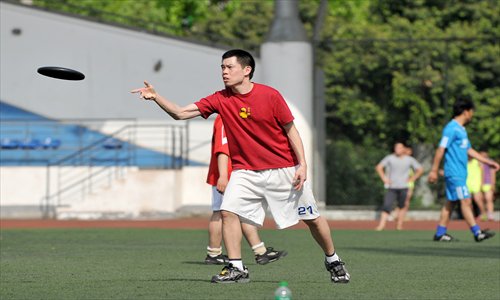A Sure Fling

Although most teams in China are based at universities, the sport is increasingly attracting non-students. Photo: CFP
One of the fastest-growing sports in the world is less than 50 years old. Invented in the US, Ultimate Frisbee has slowly gained a foothold on Chinese campuses and beyond - by demolishing preconceptions that it is merely a recreational activity played with a toy.
"I had seen Frisbees before but thought it was only for children and pets," said a 19-year-old student who identified herself as Xiaohan. She joined an Ultimate Frisbee team last year after seeing the sport being played on the field at her school, the University of International Business and Economics (UIBE). She was surprised by its simplicity. Xiaohan had never been interested in sports before because she felt that football and basketball were too difficult to learn and that the physical contact involved might cause injury. After just a few minutes learning how to throw the flying disc, however, she was able to join the game. Xiaohan likes the fact that the teams are coed and that the constant running helps her stay fit.
The sport is called "Ultimate" because it is not limited by age or gender - anyone can play, said Russell Young, 55, who coaches Xiaohan's team, Bazinga.
Young, an American who has played the sport for nearly 40 years, came to China in the late 1980s to teach English. Whenever he tossed the flat disc around with other expats, Young said, many Chinese passersby just assumed that they were playing a "childish" game. But a few curious students stopped by and asked to learn. Starting in 2003, Young started coaching several university teams.
Ultimate Frisbee has similarities to basketball, soccer and American football, but no contact in play is allowed. Nor are there referees, as players are expected to hold themselves to high standards of fair play and honesty.
In the past two decades, the sport has slowly spread across the country. At the 7th China Nationals, held this May in Shenzhen, Guangdong Province, over 300 players competed on 18 teams from several different cities. In order to grow local talent, less than 30 percent of any team playing for the Chinese championship can be foreign and only two foreigners can play on the field at any time.
But the language of Ultimate is English. During games, players shout jargon - "travel" for a foul, "chill" for a strategic pause - that reflects the sport's American roots. Even at the national level, during matches between teams consisting entirely of Chinese members, the lingo on the field is English.
"We only use Chinese translations to explain fouls to beginners," Xiaohan said.
Although the weather is cooling down and Beijing's air quality is not always friendly to outdoor athletes, Xiaohan said that Bazinga still attracts some 20 players, over half of whom are non-students, on a weekly basis.
Because grass is essential to Ultimate Frisbee, it can be played on football pitches or even grassy areas of the park. Xiaohan and her teammates often use the football pitch on the UIBE campus. However, they usually have difficulty booking the field; sometimes they're even heckled by some football players who see them as trespassers.
"They claimed to have priority use of the field because football is a proper sport whereas we are 'only playing a game,'" Xiaohan said. For all its success, it seems that Ultimate Frisbee still has a long way to go in China.